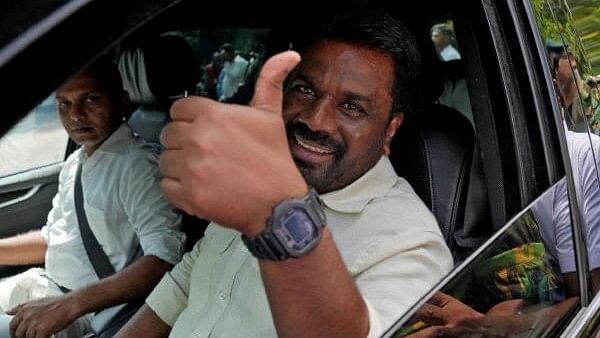
Sri Lanka's President and National People's Power (NPP) party leader Anura Kumara Dissanayake gestures as he leaves after casting his vote on the day of the parliamentary election in Colombo, Sri Lanka, November 14, 2024
Credit: Reuters Photo
Chennai: President Anura Kumara Dissanayake of the Janatha Vimukthi Peramuna (JVP), which led two insurgencies against the Sri Lankan state, scripted history on Friday by powering the National People’s Power (NPP) to a two-thirds majority in the country’s 225-member Parliament.
The landslide win was even sweeter as voters in ethnic Tamil-dominated areas, for the first time, reposed their trust in JVP, billed as a Sinhala-Buddhist party, leaving the Tamil parties trailing behind.
This is also the first time that a single political combine has secured a brute two-thirds majority in Sri Lankan Parliament since the proportional representation system came into being.
The 159 seats that the NPP won is a giant leap from the mere three seats that the alliance managed in 2019 Parliament polls. The credit should go to Anura Kumara, who travelled across the island country seeking a majority for the NPP to fulfill its promises of a corruption free administration and reducing taxes among others.
NPP swept almost every district in Sri Lanka, including those dominated by ethnic Tamils and upcountry Tamils, except in Batticaloa in the east where the Ilankai Tamil Arasu Katchi (ITAK) won. In Trincomalee, the home district of Tamil National Alliance (TNA) leader R Sampanthan, the NPP won two seats. Samagi Jana Balawegaya (SJB) of the Leader of Opposition Sajith Premadasa won 40 seats, and the ITAK eight, while the Sri Lanka Podujana Party (SLPP) of the Rajapaksas bit the dust with just three seats.
NPP’s prime ministerial nominee Dr Harini Amarasuriya clinched a spectacular victory by winning Colombo district with over 6.55 lakh preferential votes.
With veterans Ranil Wickremesinghe, Mahina Rajapaksa, and many other leaders staying away from the elections, the 10th Parliament will not just be young but with a majority of first-time and new generation lawmakers. Not just in the Sinhala-majority areas, the NPP also swept Colombo, Nuwara Eliya, and Hambantota, the traditional strongholds of Wickremesinghe’s United National Party (UNP) and the Rajapaksas respectively.
Dissanayake, whose popularity has been on the rise since his election as President in September, will not have “any excuses” now in implementing economic and political reforms as the country limps back to normalcy after an unprecedented economic crisis in 2022. It is the 2022 Araghalya agitation that brought Dissanayake to the political central stage, culminating in his ascension as Sri Lanka’s ninth Executive President in September.
The icing on the cake was NPP making deep inroads into the Tamil heartland by winning five seats in Jaffna and Vanni districts, areas that were once the battlefield between the now-vanquished Liberation Tigers of Tamil Eelam (LTTE) and the Sri Lankan Army. Though NPP fielded Tamil candidates, the fact that Tamil chose nominees from the JVP itself is momentous given the past acrimonious relationship between the two.
The continuous “disunity” among Tamil politicians, alienation of the youth and their aspirations are some of the reasons for the community to ditch its own leaders and vote for NPP. Not just NPP, Premadasa’s SJB has also won seats in Tamil areas, ringing alarm bells in all Tamil parties that have had unflinching support of their people for decades.
“NPP’s victory is a result of disenchantment of the Tamil voters towards their leaders. It is not because the NPP took serious efforts, it is because the Tamil population was tired of the internal bickering and ego clashes of their leaders in the name of Tamil Nationalism,” N Sathiya Murthy, a strategic expert who has rich experience of covering Sri Lanka, told DH.
R Bhagwan Singh, a long-time Sri Lanka watcher, too spoke on similar lines by faulting the Tamil parties for not participating in the 2022 Araghalya protests. “They failed to see the anger in Tamil youth, and today, the angry Tamil youth has spoken loudly in favour of Anura Kumara. This is a momentous political event in Sri Lanka’s history,” Singh added.
Singh also added that NPP’s win in the north reinforces former President Mahina Rajapaksa’s declaration after the end of the war in 2019 that Sri Lanka was one country and it was for people of all ethnicities.
“It is the beginning of the end of Eelam (a separate Tamil country) as we now have Tamil people in Jaffna and Vanni elect a party with distinct Sinhala identity and rejecting the Tamil parties that had all along done their political business waving the flag of separate Tamil state of Eelam,” he said.
“Turn the page on this same story, which now devolves upon the emerging enlightened Sinhala political class the responsibility of taking the Tamil people along, and proving to the civilised world that the subjugation of minorities is now just a troubled part of the island’s past,” Singh added.